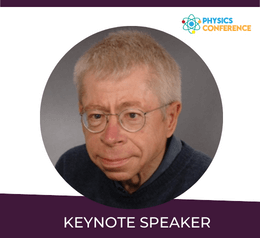Scholars International Conference on
PHYSICS AND QUANTUM PHYSICS
THEME: "Frontiers in Physics and Quantum Physics"
 22-23 Jun 2022
22-23 Jun 2022  NH Potsdam, Berlin, Germany & Online
NH Potsdam, Berlin, Germany & Online THEME: "Frontiers in Physics and Quantum Physics"
 22-23 Jun 2022
22-23 Jun 2022  NH Potsdam, Berlin, Germany & Online
NH Potsdam, Berlin, Germany & Online 
Universidad Nacional de Colombia, Colombia
Title: Quantum randomness in spin measurement: a unitary approach
Thomas Dittrich studied physics and philosophy in Hamburg. His research on complex quantum dynamics started with his Ph.D. in Essen and continued during postdoctoral stays at the Weizmann Institute, University of Augsburg, and MPI for the Physics of Complex Systems. In parallel with his position as professor of theoretical physics at Universidad Nacional de Colombia in Bogotá, which he has held since 2000, he has enjoyed research stays in Germany, Israel, Mexico, India, and Brazil. He publishes on quantum chaos, semiclassical methods, quantum information, and randomness.
Spin measurement is studied as a unitary time evolution of the spin coupled to an environment representing the meter and the apparatus. Modelled as a heat bath comprising only a finite number of boson modes and represented in a basis of coherent states, the environment can be fully included in the quantum time evolution of the total system. We numerically simulate standard measurements of the polarization of spins, initially prepared in an unpolarized pure state. The likewise pure initial state of the environment is constructed as a product of coherent states of the boson modes with their centroids distributed thermally around the origin of phase space. With a corresponding time-dependent modulation of the self-energy of the spin and the coupling to the heat bath, we observe the outcome of the measurement in terms of the long-time behaviour of the spin. Owing to the interaction with the heat bath, the spin gets entangled with it and loses coherence, reproducing the "first collapse of the wavefunction". The expected quantum randomness in the final state is manifest in our simulations as a tendency of the spin to approach either one of the two eigenstates of the measured spin operator, recovering most of its initial purity. The unitary time evolution allows us to reproducibly trace these random final states back to the respective initial states of the environment. We record this evolution also in terms of the mutual entropy of the two subsystems. Quantum randomness in this approach is thus revealed as a manifestation of the thermal randomness of the macroscopic measurement apparatus.